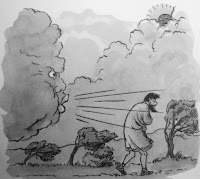
The wind and the sun were arguing about who was stronger. Then they saw a man walking down a road.
The sun said, “I know how to settle this argument. Let’s see who can force this man to take his coat off. Let’s see which one of us can force this man to take his coat off. You can begin.”
The sun hid behind a cloud and the wind began to blow and blow; but the harder it blew, the more the man pulled his coat tighter. Finally, the wind gave up, saying, “OK, I give up. It’s your turn.”
Then the sun took its turn. It came from behind the clouds and smiled down upon the man. Within a few minutes, the man took off his coat because of the sun’s warmth.
VOCABULARY
What is the part of speech?
(noun, pronoun, verb, infinitive, adjective, adverb, preposition, conjunction)
a. to argue The wind and the sun were arguing. ________________
b. argument I know how to settle this argument. _________________
c. to settle I know how to settle this argument _________________
d. to force Who can force this man to take his coat off? _______________
e. to give up The wind gave up. I give up. ________________
f. to be one’s turn It’s your turn. _________________
g. to take one’s turn The sun took its turn. ________________
h. to turn When you get to the corner, turn right. ________________
i. to turn off Turn your cell phone (TV, CD. radio) off. ________________
j. to turn around Stand up. Now turn around and face the class. _____________
i. __________________________________________________________________
Two-word verbs
Look at the story and notice the two-word verbs. For example.
a. the wind and sun were arguing about . . .
b. a man was walking down . . .
c. I know how to . . .
d. to take off his . . .
e. The wind gave up (the contest, his seat
f. The sun smiled down upon . . .
YOUR TURN
Please write your own sentences using
1. argue about _______________________________________________________
2. walk down _______________________________________________________
3. know how to _____________________________________________________
4. take off _______________________________________________________
5. put on _______________________________________________________
6. listen to _______________________________________________________
7. buy (something) for (someone) _______________________________________________________________
8. take (something) back [return] _______________________________________________________________
9. write (a letter or email) to (someone)
_______________________________________________________________
GRAMMAR
1.
Please tell me, what are the subjects and what are the 14 past and past continuous verbs?
Subject past tense past continuous tense singular/plural
a. the wind and the sun were arguing √
b.
c.
d.
e.
f.
g.
h.
i.
j.
k.
l.
m.
2.
POSSESSIVE NOUNS
When you have two nouns together and the second noun belongs to the first noun, then use an apostrophe to show possession,
For example:
a. the sun’s warmth [the warmth of the sun] I can feel the sun’s warmth.
b. Sally’s pen, [the pen that belongs to Sally] Sally’s pen is blue.
c. the doctor’s office, [the office of the doctor] I’m going to the doctor’s office.
d. the ladies’ room [the room where the ladies go to the bathroom]
Where’s the ladies’ room? PLEASE NOTE THE PLURAL then S’
e. Charles’s apartment [the apt. where Charles lives] PLEASE NOTE THE NAME,
then S’ Charles’s apartment is on Powell Street.
YOUR TURN:
Please write a sentence with each of these possessive nouns
1. the books that belongs to Bill
_______________________________________________________________
2. the room where men go to the bathroom _______________________________________________________________
3. the pen that belongs to Mr. Jones
_______________________________________________________________
4. the house where your parents live
_______________________________________________________________
5. something that belongs to your friend
_______________________________________________________________
3.
Let’s + base form means that you are asking someone else to join you in doing something.
For example, Let’s go out to lunch. Let’s watch some TV together. Let’s play mahjong.
YOUR TURN. Please write your own sentence using Let’s + base form
4.
BECAUSE OF + a noun because of the sun’s warmth
Notice the difference between
For example: I’m studying English because I want to get a better job.
I come to school because of my poor English.
YOUR TURN
Write two sentences
a. because ________________________________________________________
b. because of ________________________________________________________
5. Find the comparatives in this story
Single-syllable adjective comparative
a. strong stronger
b.
c.
YOUR TURN
Please use the three adjectives above and write your own sentences with the comparatives.
1.
2.
3.
THE HARDER….THE MORE
The harder the wind blew, the more the man pulled it tigher
THE comparative adjective + noun, THE MORE + subject and verb
For example The better the sale, the more I buy.
The sweeter the candy, the more I like it.
The harder the bed, the worse I can sleep. I like a soft bed.
The softer the bed, the better I can sleep.
YOUR TURN
Write one sentence using
THE comparative adjective + noun, THE MORE + subject and verb
________________________________________________________________________
CONVERSATION
Tell me about an argument you had with someone.
sgati©2009












